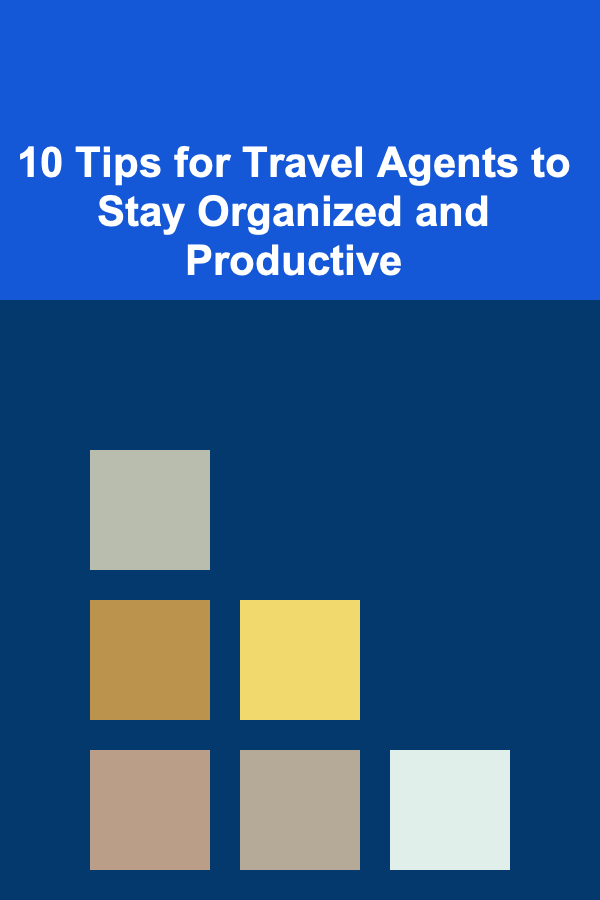
10 Tips for Travel Agents to Stay Organized and Productive
ebook include PDF & Audio bundle (Micro Guide)
$12.99$9.99
Limited Time Offer! Order within the next:

Being a travel agent involves handling numerous tasks---researching destinations, booking flights, arranging accommodations, creating itineraries, managing clients' special requests, and constantly communicating with vendors. With so many responsibilities on your plate, staying organized and productive is essential not just for your success but also for maintaining a healthy work-life balance.
In the world of travel, clients expect a seamless, professional service. Therefore, an organized approach is key to providing that high level of service. Whether you're working for a travel agency, as an independent contractor, or managing your own business, the following 10 tips will help you stay organized, streamline your processes, and boost your productivity.
Adopt a Robust Booking and CRM System
For travel agents, having a reliable Customer Relationship Management (CRM) system is a must. A CRM helps you keep track of all client interactions, bookings, preferences, and travel history. By using a good CRM tool, you can easily manage both current and future trips, avoid double bookings, and ensure that no client request is forgotten.
In addition to a CRM, make sure to adopt a booking system that is user-friendly and integrates seamlessly with airlines, hotels, and car rental companies. This allows you to quickly make reservations and keep all the information in one centralized location. Many travel agents use systems such as Sabre, Amadeus, or Travel Leaders Network for this purpose.
Having a well-organized digital system to manage bookings, customer data, invoices, and communications reduces the chances of human error and frees up time for more productive tasks.
Create Template Documents for Repeated Tasks
As a travel agent, there are certain documents and communications you will frequently use. From booking confirmations and itineraries to travel insurance documents and special requests forms, repetitive tasks can take up a large portion of your time. One way to streamline this process is by creating templates for these common documents.
Here are a few examples of templates you can create:
- Itinerary Templates: Customize an itinerary template where you can easily fill in the client's travel details. This will save you from having to design each itinerary from scratch.
- Booking Confirmations: Have a template ready for flight, hotel, and car rental confirmations, including placeholders for the client's details.
- Email Responses: Prepare email templates for responding to frequently asked questions, such as inquiries about travel packages, payment schedules, and visa requirements.
Using templates not only saves time but also ensures consistency in your communications, which can improve your professional image.
Use Cloud Storage for Easy Access to Documents
In the fast-paced world of travel, accessing the right documents at the right time is crucial. Cloud storage services such as Google Drive, Dropbox, or OneDrive allow you to store all your important documents, itineraries, contracts, and client information in one easily accessible place.
By using cloud storage, you can access your files from any device with an internet connection, which is especially useful when you're traveling or working remotely. Additionally, cloud storage allows you to collaborate easily with team members or clients by sharing documents in real-time.
Prioritize Tasks Using a Daily/Weekly Planner
Time management is a travel agent's best friend. There will always be tasks competing for your attention, so prioritizing is essential to ensure nothing falls through the cracks. Whether you prefer a physical planner or a digital one, setting aside time each morning or evening to plan your day or week is crucial.
Here's how you can structure your schedule to improve your productivity:
- List Out Your Tasks: Write down everything you need to accomplish that day or week, including client meetings, bookings, follow-ups, and research.
- Categorize Tasks: Separate tasks into categories like urgent, high priority, and low priority. Focus on completing the most urgent tasks first, such as client calls or booking deadlines.
- Time Blocking: Block off specific times for certain tasks (e.g., 9:00 AM--10:00 AM for researching new destinations or 3:00 PM--4:00 PM for follow-up emails). This helps you stay focused and ensures you're not jumping between different tasks.
By sticking to a well-structured schedule, you'll feel more in control of your day and get more done in less time.
Set Up Automated Email Campaigns
As a travel agent, you likely have many clients at different stages of their travel planning process. Managing email communications with clients, especially those who are still considering their travel options, can become time-consuming. Setting up automated email campaigns helps you stay in touch with prospects and clients without having to manually send each email.
For example, you can automate:
- Welcome Emails: When a client first contacts you, send an automated email with introductory information, available packages, and a call to action.
- Post-Trip Emails: Send follow-up emails after a client returns from their trip to request feedback or offer incentives for repeat business.
- Booking Reminders: Set up an automated email reminder for upcoming bookings, payment due dates, or important travel information.
Automating your email campaigns reduces the amount of time you spend on repetitive communication and ensures that clients receive timely information.
Maintain a Client Database
Having a well-organized client database is critical for staying on top of your business. A comprehensive client database should include:
- Contact Information: Names, email addresses, phone numbers, and preferred modes of communication.
- Travel History: Past trips, preferences, special requests, and loyalty programs.
- Future Trips: Upcoming bookings, pending payments, and special notes (e.g., client's anniversary trip or preferred room type).
- Feedback: Record any client feedback or reviews after each trip, which can help you personalize future bookings.
By keeping this database updated, you can easily recall important details about your clients and provide personalized, attentive service. This is a critical element in building lasting relationships and ensuring repeat business.
Outsource or Delegate Non-Essential Tasks
As a travel agent, your core function is to provide expert advice, curate personalized travel experiences, and deliver excellent customer service. However, other tasks---such as administrative work, social media management, or bookkeeping---can take away time from more important duties.
Outsourcing or delegating non-essential tasks is a great way to boost productivity. Here are a few tasks you can consider outsourcing:
- Administrative Work: Hire an assistant or virtual assistant to handle data entry, document preparation, and client follow-ups.
- Social Media Management: If social media is part of your marketing strategy, consider hiring a social media manager to create and schedule posts.
- Accounting: Outsource bookkeeping tasks to a professional to manage invoices, receipts, and taxes.
Delegating routine tasks allows you to focus on what you do best---serving your clients and growing your travel agency.
Utilize Travel Agent Networking and Collaboration
Networking with fellow travel agents, industry vendors, and tourism organizations is a valuable way to stay informed about the latest industry trends, special promotions, and best practices. Attending industry conferences, participating in online forums, and joining professional associations such as the American Society of Travel Advisors (ASTA) or the Global Business Travel Association (GBTA) can help you stay ahead of the curve.
Additionally, collaborating with other travel agents can be a great way to divide responsibilities for larger or more complex bookings. Working together enables you to offer a more comprehensive service and expand your clientele.
Stay Up to Date with Industry News and Trends
The travel industry is constantly evolving, with new destinations, technologies, and regulations shaping the market. Staying informed about these changes will help you provide clients with the most up-to-date information and maintain your competitive edge.
To stay on top of trends, consider subscribing to industry publications like Travel Weekly or Travel + Leisure, and regularly visit websites and blogs that focus on travel news. Also, follow key influencers and organizations on social media for real-time updates.
By staying informed, you'll be able to offer clients the most current and exciting travel options available.
Take Breaks and Practice Self-Care
While being productive and staying organized is important, it's equally crucial to take care of your physical and mental well-being. The travel industry can be high-pressure and stressful, so taking regular breaks and practicing self-care can help you avoid burnout.
Some ways to incorporate self-care into your routine include:
- Setting Boundaries: Avoid answering work emails or taking calls during your personal time.
- Taking Regular Breaks: Step away from your desk for short breaks to rest your eyes and stretch your body.
- Exercise: Physical activity can help reduce stress and improve focus.
- Mental Health: Engage in activities that promote mental wellness, such as meditation or journaling.
Remember, taking care of yourself is not only beneficial for your personal well-being but also helps you maintain a high level of productivity and service for your clients.
Conclusion
In conclusion, staying organized and productive as a travel agent involves more than just managing bookings and client communications. By adopting the right tools and strategies, you can streamline your processes, manage your time effectively, and provide exceptional service to your clients. The tips outlined above---ranging from implementing CRM systems to prioritizing self-care---are designed to help you work smarter, not harder. By focusing on efficiency, consistency, and personal well-being, you can create a thriving travel agency that stands out in a competitive industry.
Reading More From Our Other Websites
- [Personal Care Tips 101] How to Embrace the Benefits of Taking Cold Showers for Overall Wellness
- [Organization Tip 101] How to Keep Essentials Accessible During the Moving Process
- [Home Storage Solution 101] How to Create Hidden Storage Spaces in Your Home
- [Personal Care Tips 101] How to Choose the Right Toothbrush for Braces
- [Home Security 101] How to Use Smart Locks for Enhanced Home Security
- [Home Pet Care 101] How to Prepare Your Home for a New Puppy
- [Home Party Planning 101] How to Organize a Surprise Party at Home with Minimal Stress
- [Star Gazing Tip 101] Monthly Milestones: A Star‑Gazing Calendar Guide to Plan Every Celestial Event
- [Home Budget 101] How to Adjust Your Home Budget for Unexpected Expenses
- [Trail Running Tip 101] Best Trail Running Poles for Stability and Power -- Choosing the Right Setup

How To Brew Turkish Coffee for a Rich Experience
Read More
How to Create a Spacious Home Office in a Small Area
Read More
How to Create a Wedding Day Packing List
Read More
How to Understand Blockchain for Machine Learning Data
Read More
How to Track Mortgage Interest After Divorce or Separation
Read More
10 Tips for Creating a Bird-Safe Outdoor Aviary
Read MoreOther Products

How To Brew Turkish Coffee for a Rich Experience
Read More
How to Create a Spacious Home Office in a Small Area
Read More
How to Create a Wedding Day Packing List
Read More
How to Understand Blockchain for Machine Learning Data
Read More
How to Track Mortgage Interest After Divorce or Separation
Read More